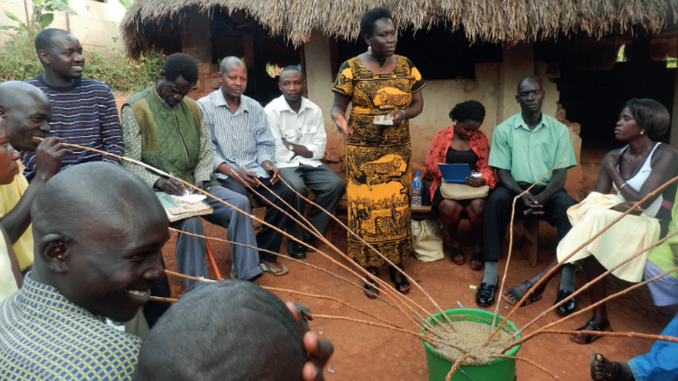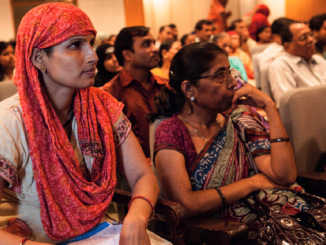
How can journalists help raise the profile of cancer and get it on the political agenda in countries where infectious diseases get most attention, reliable data are scarce, doctors are reluctant to talk and editors prefer cheery topics? Two award-winning reporters speak of the challenges they face
In April, Cancer Research UK reported that half of the people diagnosed with cancer today will survive the disease for at least another ten years, compared with a quarter in the early 1970s.
That is in a developed country. Then there is Africa. At Uganda’s Cancer Institute, 20,000 of the 22,000 patients attending each year will die within 12 months. In Zimbabwe, there aren’t even reliable statistics on how many people have cancer: the government estimates 7000 – even though the population is nearly 14 million. The probable reason: large numbers die even before they have a diagnosis.
In such environments, African journalists feel they have a special role to play, revealing deficiencies in services and communicating potentially life-saving health education.
But they live in a different world than the privileged reporters of information-rich Europe. Two recipients of a special award for cancer journalism have spoken of the barriers they face: lack of access to information; official resistance; reluctance of doctors to speak to them; editors adamant that their readers want to hear about more cheerful things than cancer.
Ugandan journalist Esther Nakkazi and Zimbabwe-based journalist Busani Bafana received special merit awards in the 2013 ESO Best Cancer Reporter Award. Through human interest stories and analysis, their articles dramatically illustrate how prevention, diagnosis and treatment are far from simple in their countries.
Based in Bulawayo, Bafana writes investigative pieces on business, the environment and society for the Inter Press Service – an innovative news agency that aims to highlight issues faced by the world’s marginalised communities. In a piece titled “Morphine kills pain but its price kills patients”, Bafana examined how in Zimbabwe, a country where diagnostic and treatment facilities for cancer are scarce, patients are dying in extreme pain before even receiving an oncology appointment. An effective supply of morphine would at least ease the suffering, but supply is short and the cost prohibitive.
Bafana talked to cancer patients about their experiences. Two daughters worked for two weeks selling enough of their chickens to raise the 18 dollars needed for a two-week supply of morphine for their mother, bedridden with stage 4 cancer of the cervix.
He wrote: “Pain is scrawled all over Ncube’s face as she narrates her tale: for six months now she has been on the waiting list to undergo radiotherapy at Mpilo Hospital. The radiotherapy machine has been broken for longer than she has been waiting and a new one is only now being installed. ‘The pain is unimaginable,’
Ncube told IPS in her home. Pointing to a white plastic bottle filled with paracetamol, a mild painkiller, she added, ‘That is all I could get from the hospital.’”
Bafana interviewed officials at the Bulawayo Island Hospice Service, which distributes limited supplies of donated morphine to its 300 patients, but is at risk of closure due to high operating costs and low donor support. He found out that in 2012 Zimbabwe used a total of 3.6 kilogrammes of morphine, despite having an allocation of 11.25 kilogrammes.
And he discovered that the cost of morphine could be brought down significantly if hospitals and pharmacies were allowed to stock morphine powder for making a liquid morphine preparation – which is cheaper and more convenient for severely ill patients to take.
“My article sought to capture that burden over the six months that I interviewed and followed patients in my home city of Bulawayo,” Bafana explained to Cancer World. “I have offered just the peak of a wider, complex problem and suffering that cancer patients and their families face in dealing with the disease.”
“My article sought to capture that burden over the six months that I interviewed and followed patients in my home city”
It was not an easy story to write. Bafana says that the issue of cancer is easily ignored in Zimbabwe, where HIV/AIDS has dominated the health agenda and traditional beliefs about cancer being part of witchcraft are still strong. Many would rather ignore the subject, even though it poses a serious health burden.
A scarcity of sources
Getting doctors and politicians to even talk about the subject is difficult. “Accessing doctors, especially oncologists, is hard. There are only two oncologists in Bulawayo. If you do manage to interview doctors in Zimbabwe, they usually won’t be named – unless everything they say is cleared by their head office, which can take a long time.”
“If you do manage to interview doctors in Zimbabwe, they usually won’t be named”
It is very rare for journalists to be able to speak to ministers. “The independent media is seen as a threat,” says Bafana. And then there is the red tape. Zimbabwe does have a cancer registry, but it doesn’t have the resources to keep information up to date, according to Bafana. A year and a half after he first put in a request for information, Bafana is still waiting to hear back from them.
“Without access to all the information we need, part of the role of journalists is largely to observe.”
In Uganda, there is a similar lack of public understanding of cancer. A 2010 Lancet study concluded that in Uganda only 13% of people survive any kind of cancer apart from breast cancer. Journalists committed to confronting this face similar problems accessing doctors and policy makers. Esther Nakkazi, a freelance science journalist who reports for a number of regional African news outlets and the Science for Development Network, won her special merit award for an article about African science cafés – an innovative way of communicating health information to very poor communities. But she too depended on observation and obtaining information from non-governmental organisations.
“When it comes to health, getting hold of experts is a real problem,” she said. “There are very few around in Uganda, and doctors are always incredibly busy.”
She reported that science cafés – normal cafés and meeting places which periodically ask scientists to discuss issues relevant to local people – are gaining popularity in Africa. The initiative began in Nairobi, Kenya, after a public engagement initiative funded by the UK’s Wellcome Trust. The subject matter is often health-related, and Esther Nakkazi described an event in a grass-thatched hut in Entebbe, Uganda, where Agnes Bukirwa, a medical officer from the charity Mildmay International, was leading discussion on cervical cancer.
Seven million Ugandan women of reproductive age are at risk of developing cervical cancer, according to WHO estimates. Around 3,600 women receive a diagnosis each year, and 2,500 die of the disease – around double the number of men and women who die in road accidents.
Nakkazi wrote in her piece: “How many people know how cervical cancer is transmitted, Bukirwa asks her audience. Pause. How many know how it is prevented? No answer. ‘Back home you have women who may have cervical cancer,’ she continues.
“A mobile phone is passed around for members to view an image of the cervix. Men shake their heads. Some laugh nervously. Bukirwa explains what HPV is, and how men can transmit it sexually. She speaks for only 30 minutes; adult learners do not want long talks.”
Nakkazi reported how those supporting the Science Café initiative, such as Ugandan scientists and charitable funders, believe that the cafés are an excellent way of spreading basic messages about health and immunisation.
There is a desperate need for such cancer education initiatives, says Nakkazi. “In Africa, the money has followed malaria, TB and HIV/AIDS, so those are the areas that have got coverage. The public know very little about non-communicable diseases such as cancer.” The effect can be devastating, she says. “There are many times more deaths from prostate cancer in Uganda than in the United States because public awareness is so poor,” she says. “Men are simply getting to the doctor far too late.”
It is the job of journalists, she believes, to raise the profile of such public health issues, and give people the information to be able to help themselves. “But there are problems,” says Nakkazi, who has her own blog and writes for East African newspapers. “In Uganda, the situation is quite unstable so the appetite is mainly for politics, not health.”
“Editors don’t make health issues a priority and don’t have many journalists covering it. If they do, it’s often a matter of reproducing a press release. There may be a story on how many doses of HPV vaccine are being sent out, for example, but there will be nothing looking into the effect of the vaccine on girls and families.”
Bafana agrees about the need for more awareness about conditions such as prostate cancer, which is three times as common in men of African and Caribbean origin as caucasians. He says that in Zimbabwe it is known as “the politicians’ disease” – because it only gets media attention when a major figure such as Robert Mugabe has it. Bafana too encounters lack of interest from editors, but he is also aware that there are all too few health reporters around in Zimbabwe who have the scientific understanding to write authoritatively about cancer.
Common challenges
The challenges that Nakkazi and Bafana face are common throughout Africa, according to Harry Dugmore, Director of the Discover Centre for Health Journalism at Rhodes University in South Africa. The centre, which opened in 2011, supports African journalists covering health and offers degrees and courses in health journalism.
“People are often surprised by how few media outlets there are in Africa, and even in countries like South Africa, where there are many newspapers and magazines, you don’t see much health journalism – apart from of the ‘fit and fabulous’ variety. I think journalists who want to write serious stories about cancer get batted away, partly because it’s a downer and partly because of the disease fatigue caused by HIV/AIDS.”
There is an unrealistic burden put on journalists in Africa, he believes, to spread public health messages, because official systems of health education are failing so badly. It has been estimated, he says, that half of the people in South Africa who have HIV or diabetes are unaware of the fact. The need for articles about symptom recognition is clear, but editors can only run so many public service articles. “We’re left in the strange situation where journalists are left carrying the can for public health education.”
“Journalists who want to write serious stories about cancer get batted away, partly because of disease fatigue”
When journalists want to write about health system failures such as long queues and waiting lists, they face a brick wall from officials. “No one denies that the health system in South Africa is in a catastrophic mess – and it’s very similar in countries such as Nigeria and Zimbabwe. But this means that hospital staff feel constantly under attack, and nearly always refuse to talk. This kind of journalism now has to be almost completely undercover.”
Support for health journalism
What is the way forward? There is increasing awareness, nationally and internationally, of the important role African health journalists have, and an acknowledgement that networking is a good way of providing support and information. The African Health Journalists Association (www.ahja-news.org) was formed in Nigeria last year, It aims to advance the professional development of journalists who cover health, raise the profile of health stories in the media and promote dialogue between journalists and experts.
Another initiative in Nigeria provides recognition to journalists who highlight important cancer issues. The charity Breast Without Spot, which raises awareness of breast and other cancers, this year launched its Journalist Cancer Control Advocate Award (http://breastwithoutspotng.org/?page_id=382), which aims to reward Nigerian journalists who show commitment in writing about cancer prevention, treatment, control and advocacy.
In Uganda, Esther Nakkazi has been leading attempts to give health journalism a firmer footing. She founded the Health Journalists Network in Uganda (www.hejnu.ug) to improve the quality and visibility of health reporting, broadcasting, writing and editing. It has 70 members. Its journal, Health Digest, of which Nakkazi is managing editor, has focused on cancer issues. She is also on the advisory panel of a project based at Makerere University to improve health literacy in Uganda by developing mass media resources for the public and schoolchildren.
So what needs to happen next? Nakkazi is adamant that training journalists to be specialists is the key. She was inspired to try and move Ugandan science journalism forward having completed a Knight Science Journalism Fellowship at MIT (Massachusetts Institute of Technology) in the United States in 2008. All too few can have such experiences, but she believes that professional networks such as the Health Journalists Network in Uganda can help educate and foster committed upcoming journalists. She’d like to see similar organisations being set up and collaborating around Africa.
Professional networks can help educate and foster committed upcoming journalists
“We’ve already tried to do some training, but funding is very limited,” she says. “The benefit is that if journalists become more active and interested in writing real health stories, with time they may become health editors.” That might eventually end the current glut of analysis-free stories about losing weight and looking beautiful.
Busani Bafana agrees that the way forward is giving journalists the means to specialise – but that does involve getting resources. “We need more fellowships, like the MIT scheme,” he says. “I personally believe that with more specialist journalists who can reflect medical knowledge and progress, you have the opportunity to do people with cancer a great service.”






Leave a Reply